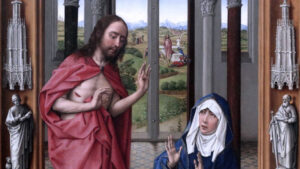
Jesus solemnly exercised the power to forgive sins for the first time on the paralytic of Capharnaum (Mt 9, 1 – 8). To testify to His divine power (for only God can forgive sins), Jesus performed the great miracle of healing this man who had been sick.
But this permanent exclusive mention of the heavenly Father meant at the same time the absence of the earthly Father. Thus Christ was the son of only one human being, namely his mother.
But if he was conceived in his mother without a human father, then Jesus, by this title “Son of Man”, is praising in a hidden but unmistakable way the miracle of the virgin birth and thus of Mary’s perpetual virginity and holiness.
It was his dearest Mother with whom Jesus, veiled but real, always associated Himself when he spoke of Himself.
Consider, for example, in this light Jesus’ solemn statement: “The Son of Man – the Son of the Virgin Mary – will come in the glory of His Father with his angels, and then he will reward each one according to his deeds” (Mt 16:27). Here Jesus clearly speaks of his double human and divine origin. The earthly virgin mother is ineffably united with the heavenly Father.
All the announcements of his suffering and death are likewise a prediction of the compassion of the Mother of Sorrows: “It is necessary that the Son of Man – the Son of the Virgin Mary – should suffer much” (Lk 9:22) and consequently that Mary should suffer much with him.
The promise of the Eucharist is also a reference to the generous Mother who, in her virginal and immaculate womb, solemnly united with the heavenly Father, prepared the bread of life: “Do not strive for the food that perishes, but for the food sufficient for eternal life, which the Son of Man – the Son of the Virgin Mary – will give you, whom God the Father has sealed with His seal” (Jn 6:27)
This once again confirms the profound principle of Saint Louis Mary of Montfort: “Never Jesus without Mary, never Mary without Jesus!”


